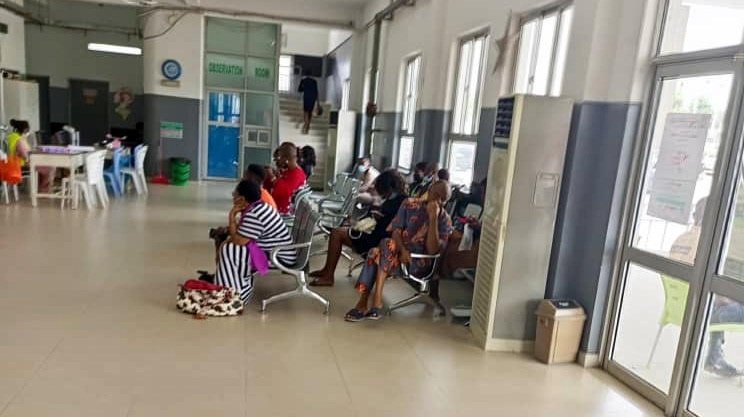The implications of the search for greener pastures by health services providers in a country are grave. When a nation allows its workforce in the health sector to seek better remunerations and welfare generally, in foreign countries (Oyibo land), because it failed to do the needful for its people, the consequences could be telling. One is that the crisis is overwhelming. The exodus (Japa syndrome) is becoming unprecedented, even, many desperate Oyibo job-seekers are on the various departure routes every passing minute. Jumoke Olasunkanmi examines the development.
The mass exodus of healthcare workers from Nigeria is not merely a statistic; it’s a dire situation with far-reaching consequences. With each departure, the already fragile health sector of the nation is further compromised, leaving behind an overburdened workforce struggling to cope with increasing demands and diminishing resources.
500 Health Workers Japa from National Hospital-Official
Just recently, the Chief Medical Doctor of the National Hospital, Abuja Mahmoud Raji decried the situation noting that no fewer than 500 health workers have left the hospital in the last two years.
Similarly, the National Association of Nigeria Nurses and Midwives (NANNM) in May 2013 reported that 75, 000 nurses and midwives have left the country in the space of five years.
NARD Confirms
In July 2023, the President of the Nigerian Association of Resident Doctors (NARD), Emeka Orji, stated that the country had only 9,000 medical doctors left. He added that the association had seen membership rate drop from an average of 16,000 to 9,000.
Psychiatrists Trend Is Alarming
President of the Association of Psychiatrists in Nigeria, Prof. Taiwo Obindo, also noted that up to two-thirds of psychiatrists leave the country annually, leaving the country with less than 250 psychiatrists and an alarming ratio of 1 psychiatric doctor to 1 million Nigerians as of 2022.
The Strain on Nigeria’s Healthcare System
One of the primary drivers of this migration is the palpable strain on Nigeria’s healthcare system. As the workload intensifies on the shoulders of the few remaining health professionals, many find themselves struggling with burnout.
WHO’s Recommendation on Doctor/Patient Ratio
With a doctor-to-patient ratio of 1: 10,000- a far cry from WHO’s recommended ratio of 1 doctor to 600 patients. And a nurse-to-patient ratio of approximately 1 to 1,160 patients in contrast to the Organization for Economic Corporation and Development (OECD)’s average of 1 nurse to 114 patients, the burden falls on the few healthcare providers left in the country.
Underpaid and overburdened, they too yearn for the stability of working in a saner clime where their skills are better recognized and remunerated.
Lamentations Of Health Workers
Okanume Chima, a nurse told African Health Report in an interview that some of the reasons his colleagues left the country were the poor remuneration, poor working environment, and the lack of incentives.
“Well, as it regards massive migration of nurses abroad, it’s being caused by several factors, which include: poor remuneration, lack of incentives, Poor working environment, and Poor hospital or government managerial policies.
The pay is bad, the working hours are long. You can barely get by after working several shifts so it is not surprising that people are leaving for better opportunities.” he said.
When asked if he would also join the scores of nurses who have left the country, he answered in the affirmative.
“About my choice to travel…, If the opportunity presents itself, yes I will travel too.”
Another Nurse, Aisha Tijani, also told AHR that she does not see herself practicing nursing full-time in Nigeria and is already in the process of leaving the country.
“As a Registered nurse and with all the hours I put in at work, I should be able to afford to pay all my bills, but I still sometimes have to call home for money, it makes no sense. I honestly do not see myself doing this job long-term in this country.
“I’m already saving for my NCLEX exam I cannot wait to leave”.
She added that poor remuneration and incentives are her biggest motivation to leave the country. She also pointed out the government’s nonchalant attitude towards addressing the ‘brain drain’ problem plaguing the sector.
“The government is not ready to improve our welfare. Now that more than half of the country’s health workers have left, there has been no mass recruitment, the burden is on us who are still here. We take on more shifts, see more patients and work around the clock. It is not even healthy”
When asked what she thought of the newest directive from the Nursing and Midwifery Council (NMC) mandating nurses to work for at least two years post-qualification before they can be verified by foreign councils, Tijani said it is another means for the government to shift its responsibility to ordinary citizens.
“Forcing people to stay will not solve the problem, what happens after the end of the two years? They (nurses) will still leave as long as the government does not give them reasons to stay.”
The story is different for Kayode Babalola, a psychiatric nurse in Ogun State who told AHR that he does not have plans to relocate despite the abysmal state of the healthcare sector.
“The entire Health sector is falling apart ai do not blame those who are leaving. I decided to stay because we can’t all leave, somebody has to take care of the people no matter how bad the situation is.
I honestly hope that the government takes workers’ migration seriously and finds solutions to it. I hope that more attention is paid to the crumbling facilities and welfare so that we no longer have to leave the country to earn a livable wage.”
Inclusion in the WHO Red List: A Grim Reality Check
The gravity of health workers’ migration was underscored by Nigeria’s inclusion in the World Health Organization’s ‘Red List’ in both 2020 and 2023. This list flags countries facing critical shortages of healthcare workers, hindering their progress towards achieving universal health coverage by 2030. While intended to deter affluent nations from poaching talent from vulnerable countries, the reality paints a starkly different picture.
Despite being on the ‘Red List,’ the exodus continues unabated. Between 2021 and 2022, over 7,000 Nigerian-trained nurses migrated to the United Kingdom alone, as reported by the UK’s Nursing and Midwifery Council. This staggering figure represents a significant loss to Nigeria’s healthcare system, exacerbating an already dire nurse-to-patient ratio.
Urgent Action Needed
As the mass migration of health workers from Nigeria shows no signs of abating, urgent action is needed to address this crisis. Beyond short-term fixes, comprehensive strategies are required to retain and incentivize healthcare professionals, improve working conditions, and invest in healthcare infrastructure. Failure to act risks not only the collapse of the healthcare system but also the well-being of millions of Nigerians who rely on it for essential medical services.
Chima earlier explained that if the government could ensure prompt payment of salaries, increase remuneration to match current inflation and provide a conducive environment, it would go a long way to discourage migration.
“Given these factors that facilitate massive migration of health workers, some of these measures, if put in place, can checkmate it…
Prompt payment of salaries and allowances, there should be an upward review of salaries to reflect the current economic situation and at least be at par with their counterpart abroad, the government should ensure that the working environment is conducive to the provision of working tools and equipment, which will facilitate day to day work in the facility.
The welfare of the workers should also be considered when formulating hospital policies as this will give them a sense of belonging.”.



